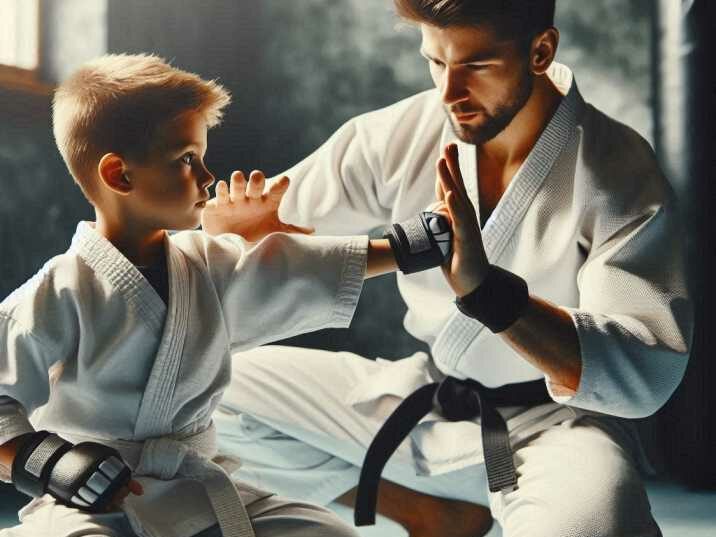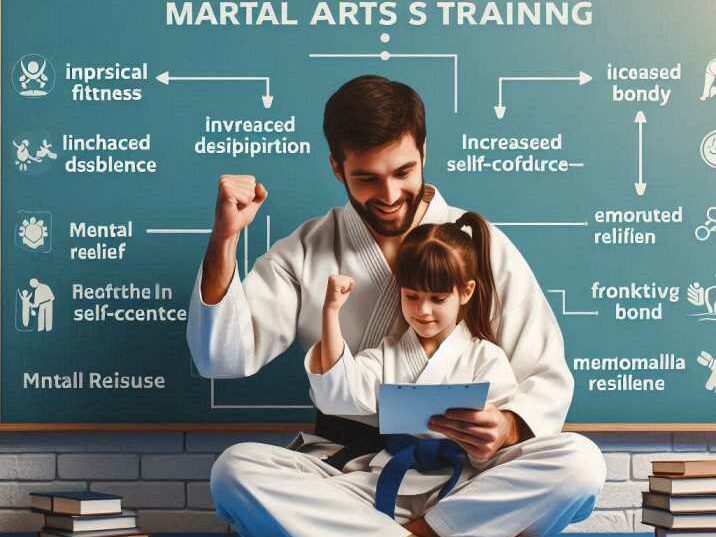Introduction:
Table of Contents
In today’s fast-paced world, mental health is a critical aspect of a child’s overall well-being. With rising concerns about stress, anxiety, and social pressures, parents are actively seeking ways to support their children’s mental health. One effective avenue gaining attention is martial arts training. This article delves into how parents can harness the power of martial arts to bolster their child’s mental health with martial arts, providing insights and strategies to help children thrive.

Child’s Mental Health with Martial Arts:
1. Understanding the Benefits of Martial Arts Training
Martial arts training offers a plethora of benefits for children, including improved physical fitness, enhanced discipline, and increased self-confidence. Additionally, it serves as an excellent outlet for stress relief and promotes mental resilience.
2. Fostering Emotional Regulation
Through martial arts, children learn valuable skills for emotional regulation. Techniques such as controlled breathing and meditation teach them to manage their emotions effectively, leading to greater emotional stability and well-being.
3. Building Confidence and Self-Esteem
Engaging in martial arts empowers children to develop confidence and self-esteem. As they master new techniques and overcome challenges, they gain a sense of accomplishment and belief in their abilities, which translates into other areas of their lives.
4. Cultivating Focus and Concentration
Martial arts training requires focus and concentration, qualities that are invaluable in today’s digital age. By practicing mindfulness and staying present during training sessions, children sharpen their focus and improve their ability to concentrate on tasks.
5. Promoting Social Connection and Support
Martial arts classes provide an opportunity for children to connect with peers who share similar interests. This sense of community fosters friendships and social support, reducing feelings of loneliness and isolation.
6. Instilling Discipline and Respect
One of the core principles of martial arts is discipline and respect for oneself and others. Through consistent practice and adherence to martial arts etiquette, children learn the importance of self-discipline, respect for authority, and treating others with kindness and empathy.
7. Encouraging Goal Setting and Achievement
Setting goals is an essential aspect of martial arts training. Whether it’s mastering a new technique or earning a higher belt rank, children learn the value of setting goals and working diligently to achieve them, instilling a sense of purpose and motivation.

Table of information Child’s Mental Health with Martial Arts:
| Aspect | Description |
|---|---|
| Benefits of Martial Arts Training | Improved physical fitness, enhanced discipline, increased self-confidence, stress relief, mental resilience, emotional regulation, focus, and concentration. |
| Recommended Starting Age | Typically 4 or 5 years old, depending on the child’s maturity level and interest. |
| Ideal Class Frequency | Attending classes 2-3 times per week ensures the full benefits of martial arts training. |
| Safety Considerations | Martial arts training is safe when supervised by qualified instructors in reputable schools. |
| Encouraging Interest | Parents should support their child’s interests and passions, even if martial arts may not be their preferred activity. |
| Finding a Reputable School | Research local martial arts schools, read reviews, visit schools, and prioritize safety and character development. |
This table provides a concise overview of the key points discussed in the article, making it easy for readers to grasp the essential information at a glance.
Conclusion:
In conclusion, martial arts training offers numerous benefits for children’s mental health, providing a holistic approach to well-being. By incorporating martial arts into their child’s routine and actively supporting their journey, parents can help nurture resilience, confidence, and emotional well-being. Together, let’s empower our children to thrive both on and off the mat.
FAQs:
- What age is suitable for starting martial arts training? Starting as early as 4 or 5 years old is suitable for martial arts training, but it ultimately depends on the child’s maturity level and interest.
- How often should my child attend martial arts classes? Ideally, children should attend classes 2-3 times per week to experience the full benefits of martial arts training.
- Is martial arts training safe for children? When practiced under the supervision of qualified instructors in a reputable martial arts school, martial arts training is generally safe for children.
- What if my child is not interested in martial arts? Encourage your child to explore different activities until they find one that resonates with them. Martial arts may not be for everyone, and it’s essential to support your child’s interests and passions.
- How can I find a reputable martial arts school for my child? Research local martial arts schools, read reviews, and visit potential schools to observe classes and meet instructors. Look for schools that prioritize safety, positive reinforcement, and character development.


